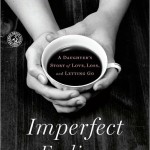Seven years ago my mother called my sister and me to tell us she had cancer. The doctor gave her less than a year to live. Despite years of complicated mother-daughter relationships, we turned our lives around in moments and flew down from New York and Boston to be with her.
Our mother had never been one to bear up under pain and she dreaded the idea of being dependent. Hours after we arrived in Florida, she made us promise to kill her when “it became too much.”
When we tried to talk rationally—using words like illegal and jail—she gave us the same demanding glare we’d known since childhood.
You have to help me, she insisted. You girls know I can’t stand pain. Promise! Promise me now!
We, of course, promised. My sister and I had never been able to withstand the glare, and we weren’t about to rebel in the face of her imminent suffering. We did however, as always, use the only weapon at our disposal: the darkest of humor.
I’ll tell you what, my sister said. How about I kill you now?
My mother, as always, frowned and then smiled and began laughing.
You girls are terrible, she said through her head-shaking chuckles.
We relaxed, all comforted by the familiar routine.
In Imperfect Endings, a memoir of daughters being asked to help plan their mother’s suicide, author Zoe Fitzgerald Carter writes the following when revealing how her husband and she wrestled with Carter’s need to help her mother:
How long are you going to run to her every time she calls?
Closing my eyes, I imagine my mother lying in her bed, lonely and afraid. Not of death but of the long ugly road leading to death. And because I am her daughter, both by birth and by design, I’m trapped on that road with her until one of us, or perhaps both of us, can engineer her release. Which mean that, despite my husband’s anger and my children’s unhappiness, the answer is: Always. I will always run to her when she calls.
Imperfect Endings is about that never perfect relationship between mothers and daughters, about how even the closest maternal love is rocked by the push-pull of a mother needing a daughter’s help and a daughter’s need for unwavering support and love. Mixed in, there is often a daughter’s wish to know her mother’s true self and a mother’s wont to hide it.
Towards the end of the book, after the author reads some of her mother’s correspondence (as her mother sleeps,) Carter writes:
Wiping my eyes, I replace the letter in the envelope and go over and place it on her table. I lie down next to her on the bed, looking around the room and out through the windows as if to see and memorize what she sees lying here day after day, because I’m afraid she’s going to leave before I know who she is, and I will be left with only words and images, the mere outlines of my mother’s life.
I stopped at that passage, breathless with a pop of recognition—remembering how little I knew my mother, but how unlike the author, I was afraid of seeing too deeply into her soul, frightened of having to take her pain. At the same time, I realized how difficult it is to reveal sadness to my own daughters and how much I want to wrap all my experiences into a ‘story.’
Zoe FitzGerald Carter is a fearless writer, going deep into a family experience none of us escape, but few of us must face so head on.
My own mother died over three years after her diagnosis. Her death was as lucky in some ways as it could be for her. Cancer never overtook her. She suffered none of the indignities of treatments. She died suddenly and unexpectedly. In one last act of care giving, my sister found my mother and, as always, took care of everything.
Carter, noting her mother’s inability to acknowledge her fears or concerns, referencing Stephen Levine, reflects that people die how they live. This is probably true, but reading this book, I found a soothing corollary. Perhaps when we sit with the people we love as they die, we can change if we want.
Carter and her sisters find their ways to comforting their mother, even as it rips them apart, even as they don’t want to let their mother go on her self-chosen time-table. Imperfect Endings provided a perfect read and I thank Zoe FitzGerald Carter for bringing me into her mother’s home.
Zoe’s book is now out in trade paperback.
(originally published in 2011)
